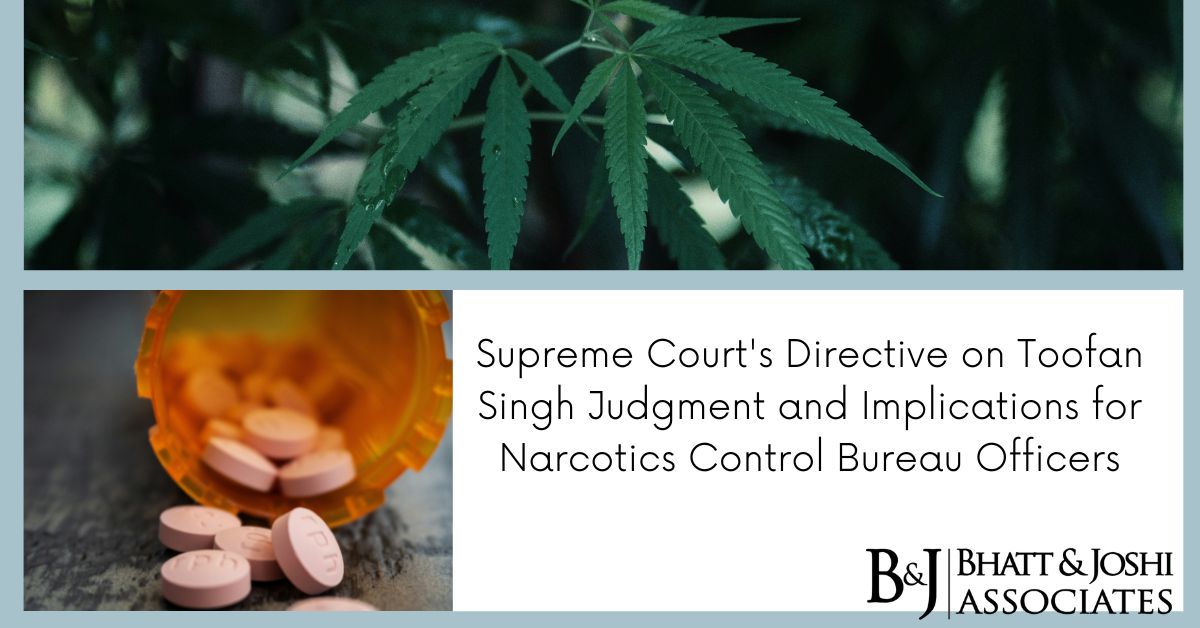Toofan Singh Judgment: Supreme Court’s Directive and Its Implications for Narcotics Control Bureau Officers
Supreme Court’s Firm Directive: NCB Officers Bound by Toofan Singh Judgment
In a recent legal development on March 6, the Supreme Court issued a categorical and unequivocal directive, instructing officers of the Narcotics Control Bureau (NCB) to strictly adhere to its three-judge Bench decision in the case of Toofan Singh vs. State of Tamil Nadu, a landmark ruling documented in (2021) 4 SCC 1. The essence of this directive lies in the Supreme Court’s insistence that officers within the Narcotics Control Bureau, a key agency involved in the enforcement of laws related to narcotics, comply diligently with the principles set forth in the Toofan Singh judgment. This judicial order carries significant implications for the conduct of investigations and the admissibility of certain types of evidence in cases falling under the purview of the Narcotic Drugs and Psychotropic Substances Act.
Landmark Toofan Singh Judgment: Confession Statements Deemed Inadmissible
To grasp the significance of the Supreme Court’s directive, it is imperative to revisit the foundational Toofan Singh judgment rendered in 2020. This landmark decision established a crucial legal precedent by categorically asserting that confessional statements recorded under Section 67 of the Narcotic Drugs and Psychotropic Substances Act are to be considered inadmissible during the trial of offenses under the same Act. The court, in its wisdom, delved into the intricacies of the legal framework and reasoned that officers appointed under the Narcotic Drugs and Psychotropic Substances Act, whether affiliated with Central or State agencies, should be treated akin to police officers. This distinction is pivotal as it has a direct bearing on the admissibility of confessional statements recorded under Section 67. The court’s rationale implied that these statements, considered as evidence in certain situations, should not be admissible in trials, thereby placing constraints on the prosecution’s ability to rely on such confessions.
Case in Focus: Tramadol Tablets Seizure and Custodial Disclosures
Against this legal backdrop, the present case comes into focus. The circumstances leading to this legal battle involve the seizure of a substantial quantity of Tramadol tablets – 5950 to be precise – from a parcel processed by DHL Express Pvt. Ltd. This event occurred on July 26, 2021, triggering a chain of events that culminated in legal proceedings. Crucially, the appellant in this case found himself entangled in the legal web when another accused person, during the course of custodial interrogation, disclosed the appellant’s name. This disclosure became a pivotal point of contention in the subsequent legal proceedings.
High Court’s Rejection and Prima Facie Evidence
In response to the looming threat of arrest, the appellant sought anticipatory bail from the High Court, presenting a defense that challenged the foundation of the prosecution’s case. The appellant contended that the case against him rested primarily on a confessional statement obtained from a co-accused. Additionally, the defense argued that there was no recovery of contraband from the appellant, and a search of his premises failed to yield any incriminating evidence. Despite these arguments, the High Court, after a careful examination of the presented evidence, rejected the appellant’s plea for anticipatory bail. The court’s reasoning was anchored in the existence of prima facie evidence linking the appellant to the seized parcel. The term “prima facie” denotes evidence that, on its face, appears to be sufficient to support a case unless rebutted or contradicted. Thus, the High Court, deeming the custodial interrogation of the appellant necessary, dismissed the appeal for anticipatory bail. This decision marked a critical juncture in the legal proceedings and set the stage for the subsequent appeal to the apex legal authority, the Supreme Court.
Supreme Court Appeal and Condonation of Delay
With the rejection of the anticipatory bail plea by the High Court, the appellant escalated the matter to the Supreme Court, seeking a reversal of the decision that mandated custodial interrogation. However, a significant factor in this legal saga was the delay of 219 days in filing the appeal. Legal procedures often come with stringent timelines, and any deviation from these timelines requires a compelling explanation. In this instance, the appellant faced the challenge of justifying the substantial delay in filing the appeal before the Supreme Court. The court, known for its adherence to procedural norms, scrutinized the explanation provided for the condonation of the delay and, evidently unsatisfied, dismissed the appeal. The dismissal of the appeal, while rooted in procedural considerations, unveiled another layer of legal intricacy. The Supreme Court, in its pronouncement, drew attention to the complaint associated with the case, explicitly noting that it referred to statements recorded under Section 67 of the Narcotic Drugs and Psychotropic Substances Act as admissible evidence.
Reaffirmation of Toofan Singh Judgment
In the aftermath of dismissing the appeal, the Supreme Court found it imperative to reiterate its stance on the admissibility of statements recorded under Section 67. Emphasizing the significance of the Toofan Singh judgment, the court restated that the authorities and officers of the Narcotics Control Bureau must unswervingly comply with and abide by the principles enshrined in Toofan Singh vs. State of Tamil Nadu. This restatement serves as a crystal-clear directive to law enforcement agencies, especially those involved in narcotics control, to align their practices with the legal framework established by the Toofan Singh judgment. The court’s insistence on compliance underscores the foundational nature of this precedent and its relevance in shaping the contours of legal proceedings involving the Narcotic Drugs and Psychotropic Substances Act.
Implications and Reflections on Legal Precedent
The legal saga outlined in this case brings to the fore several critical aspects that have broader implications within the realm of criminal law and the enforcement of narcotics-related statutes. Firstly, the Toofan Singh judgment, having been reaffirmed by the Supreme Court, reinforces a fundamental principle in criminal jurisprudence – the exclusion of certain types of evidence based on procedural considerations. By deeming confessional statements recorded under Section 67 inadmissible, the court upholds the sanctity of legal procedures and underscores the need for adherence to due process. Secondly, the case highlights the delicate balance between the necessity for law enforcement agencies to conduct thorough investigations and the rights of individuals accused of offenses. The rejection of anticipatory bail by the High Court, coupled with the subsequent dismissal of the appeal by the Supreme Court, underscores the courts’ inclination to prioritize the need for custodial interrogation in specific situations. Thirdly, the procedural nuances, such as the condonation of delay, bring attention to the meticulous nature of legal proceedings. Adherence to timelines and the provision of compelling justifications for any deviation are integral components of the legal framework, ensuring that justice is dispensed in a fair and systematic manner.
Conclusion: Upholding Legal Integrity in Narcotics Cases
In conclusion, the legal journey encapsulated in this case provides a multifaceted lens through which to view the dynamics of narcotics-related legal proceedings. From the foundational Toofan Singh judgment, emphasizing the inadmissibility of certain confessional statements, to the practical implications in a specific case involving Tramadol tablets, and finally, the procedural intricacies surrounding the appeal to the Supreme Court – each facet contributes to the evolving tapestry of Indian criminal jurisprudence. The Supreme Court’s directive to NCB officers to adhere unwaveringly to the Toofan Singh judgment serves as a pivotal reminder of the judiciary’s role in upholding the integrity of legal processes. As law enforcement agencies navigate the challenging terrain of narcotics control, they are bound by the legal principles established by precedent judgments, ensuring that the pursuit of justice remains firmly anchored in a framework that balances the needs of investigation with the rights of the accused.










